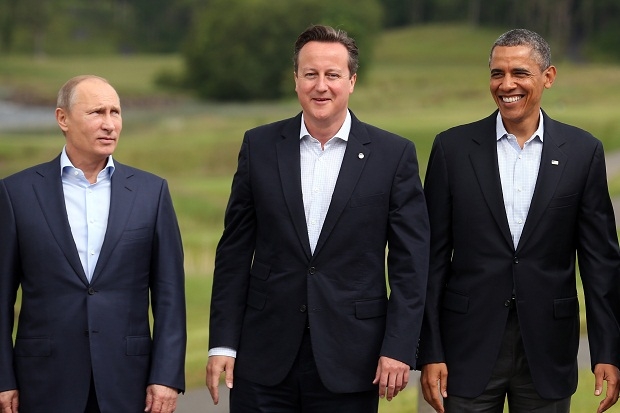The tense situation in Ukraine has escalated overnight. A deadline has passed for pro-Russian agitators to vacate government buildings in eastern Ukraine or face military action. There is no indication that the agitators have retreated. Meanwhile, reports from Kiev suggest that the government is trying to raise volunteer militias – perhaps in an attempt to avoid deploying the country’s armed forces, which would antagonise Russia.
Last night a special session of the UN Security Council, called by Russia, was the scene of disagreement between Russia and the western powers. Ukraine and the western powers say that Russia is behind this unrest; as Vladimir Putin tries his hand at provatskiya (as described by Anne Applebaum in the Spectator recently). The US ambassador to the UN, Samantha Power, said:
‘These armed units … raised Russian and separatist flags over seized buildings and have called referendums and union with Russia. We know who is behind this.’
The Russians deny these charges, and condemn Kiev’s ‘criminal’ actions.
These diplomatic exchanges are taking place while Russian troops (between 35,000 and 40,000 depending on which – if any – satellite image you trust) are deployed along the Ukrainian frontier. No western government, except distant America, can match such power. More worrying even than those soldiers is Europe’s continued reliance on Russia’s energy resources, which our business columnist Martin Vander Weyer described a few weeks ago.
Furthermore, energy and defence policy in European countries are a matter of priority not necessity. Britain, for example, has chosen to cut £2.5bn from the defence budget while increasing the international aid budget by the same amount. It may be ‘the right thing’ to spend 0.7% of GDP on international aid; but it is no substitute for steel at moments like this. Putin, then, holds the whip in this affair – and he knows it, as the Crimean adventure proves.
These facts make the West’s policy rather strange. What does it hope to achieve in a country that it is too weak to shape? (Matthew Parris, Owen Matthews and Liam Halligan have all written pieces to that effect in the Spectator in recent weeks, arguing that the West should steer well clear of Ukraine and leave it to Mr Putin.)
But what does Vladimir Putin hope to achieve by his present policy? This morning’s papers offer a view on this question, but none is convincing. The reason for this is, I think, because Putin’s policy is not clear. After the decisiveness that he showed in Crimea, he seems cautious now (assuming that Russian special forces have not infiltrated eastern Ukraine). Serious civil unrest bubbles along his country’s border, yet all he has done is to express his mistrust of the West in the UN Security Council.
And, obviously, the West does not trust Putin. Diplomacy cannot function without trust – that’s what makes this crisis so alarming. Even if there is no further escalation in Ukraine, Western-Russian relations have been damaged, undoing some of the achievements of the post-Communist era.






Comments